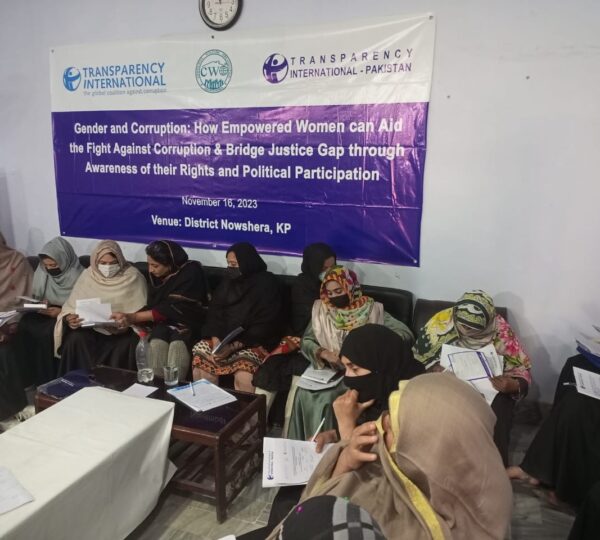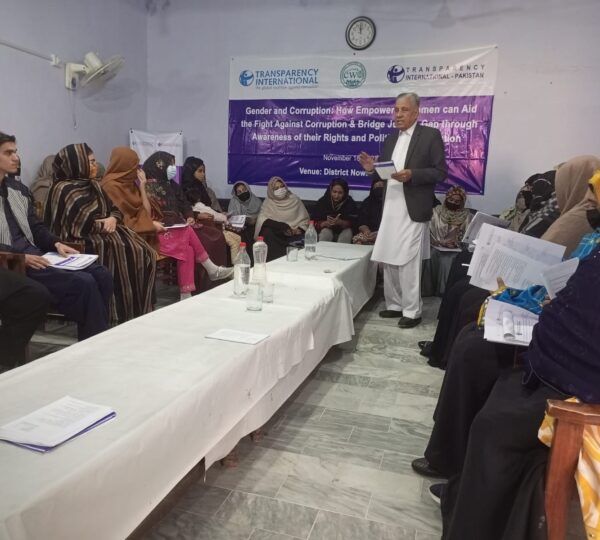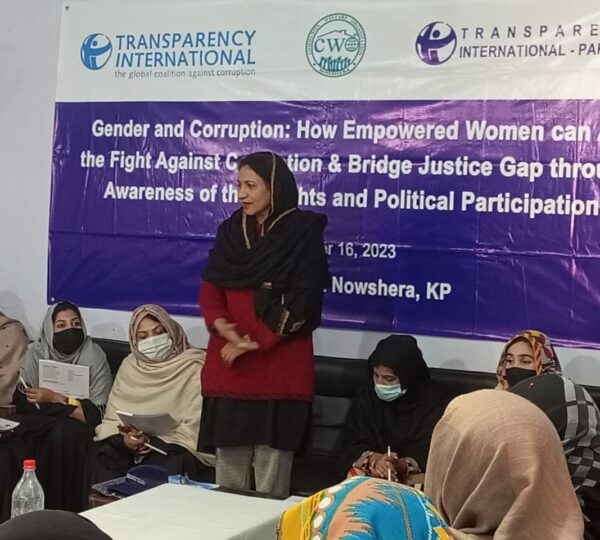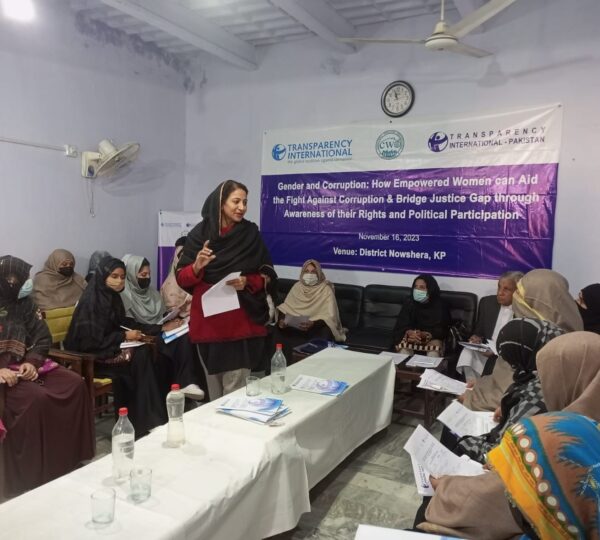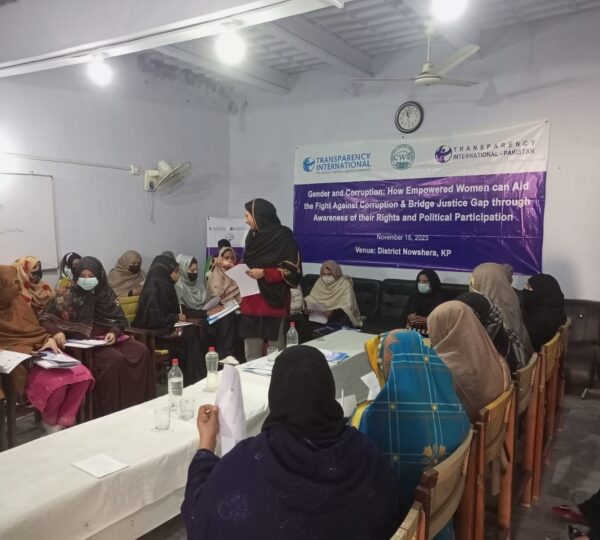- Home
- Gender and Corruption: How Empowered Women Can Aid the Fight Against Corruption & Bridge Justice Gap Through Awareness of their Rights and Political Participation Nowshera Khyber Pakhtunkhwa
Gender and Corruption: How Empowered Women Can Aid the Fight Against Corruption & Bridge Justice Gap Through Awareness of their Rights and Political Participation Nowshera Khyber Pakhtunkhwa
Workshop: Gender and Corruption: How Empowered Women Can Aid the Fight Against Corruption & Bridge Justice Gap Through Awareness of their Rights and Political Participation
Date and Day: Thursday, November 16, 2023
Venue: Nowshera Khyber Pakhtunkhwa
Transparency International Pakistan organized a one-day training workshop in Nowshera, Khyber Pakhtunkhwa on November 16, 2023. The workshop focused on the crucial connection between gender and corruption, emphasizing how empowered women can contribute to the fight against corruption and bridge the justice gap by being aware of their rights and actively participating in politics.
Approximately 50 participants from various backgrounds, including Civil Society Organizations (CSOs), youth, females from minority groups and vocational center, and community members, attended the workshop.
The session commenced with the recitation of verses from the Holy Quran, setting a respectful tone. Ms. Nasreen Memon, Gender Resource Person TI Pakistan, welcomed the participants and outlined the workshop’s objectives.
Ms. Memon shared the different types of corruption that affect women, emphasizing the unique challenges women face in this regard. She pointed out how corruption disproportionately impacts marginalized and economically disadvantaged populations, restricting women’s involvement in public, economic, and political spheres and diminishing their influence in decision-making processes.
She explained that traditional gender roles create unequal power dynamics, making women more likely to face abuse of power and be at risk of corruption. Overall, the workshop aimed to raise awareness about the intersection of gender and corruption and emphasize on social accountability tools to empower women to be active participants in combating corruption, and promote a better understanding of women’s rights in the context of political decision-making.
Ms. Zahida, social activist shared her experience that because of a long history of unfair treatment, there’s a power difference between men and women. This difference can lead to unfair treatment of women, especially in situations involving corruption and exploitation. Due to societal expectations, women often face greater risks of being affected by corruption.
Ms. Amber, a women activist from a minority group, expressed her apprehension that she is continuously working on the mission for empowering women and girls who are facing political, economic, and social inequality. She emphasized that we all must deeply see and work on the root causes of gender inequality, including addressing the higher level of poverty, lack of access to basic services, and higher underrepresentation of women in leadership and decision-making positions.
Mr. Kachkol Achakzai, Executive Director, Community Welfare Organization (CWO) provided an overview of The Khyber Pakhtunkhwa Right to Information Act 2013. The Act was passed by the provincial legislature with the fundamental objective of empowering citizens, promoting transparency, and ensuring accountability in the functioning of the Government. The Act explicitly states, “Every citizen shall have the right to access information in all matters of public importance, subject to regulations and reasonable restrictions imposed by the law.”
Mr. Achakzai went on to elaborate on the key provisions of the Khyber Pakhtunkhwa Right to Information Act, 2013. According to the RTI Act, designated Public Information Officers play a crucial role in assisting citizens with information requests. Under the KPK RTI Act, the KP Information Commission is entrusted with determining whether the public interest in the disclosure of certain information outweighs the potential harm. If affirmative, the Commission can direct the concerned Public Information Officer to provide the requested information.
As per the RTI Act, individuals can submit complaints or post information requests (along with a copy of their CNIC) through mail, fax, or email to the PIO of the relevant public body. The PIO will then send an acknowledgment receipt and is obligated to provide the requested information within the prescribed time frame of 10-15 working days. This framework ensures a systematic and transparent process, allowing citizens to access information while maintaining a balance between public interest and potential harm.
The participants were divided into 4 groups and were given an RTI brochure by TI Pakistan to enhance their understanding of the act and prepare RTI requests to the concerned departments. Applications were prepared, addressed to the Education Department, Health Department, Municipal Services, Revenue Department, Planning and Development, and Women Development Departments.
During the session, Ms. Nasreen passionately motivated participants to actively engage in community service, volunteerism, and political activities to amplify their voices. Additionally, she talked about the election processes, including how to register as a voter, how to access and check voter lists, and the procedure for lodging complaints.
She also advised women participants to seek legal advice from the Advocacy and Legal Advice Centre, established by TI Pakistan. Towards the end, an open discussion was held where participants asked questions from the trainers and shared their views.
Participants and speakers expressed gratitude towards TI Pakistan for organizing a training workshop on the pivotal theme of Gender and Corruption. They pledged to apply the acquired skills in their organizational and individual efforts for women’s rights, and advocated for increased use of the RTI law within the community.


